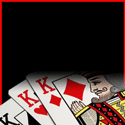







Get the best out of Free Bets from leading bookmakers with the assistance of advanced matched betting software.

A few basic poker concepts
by Erik Cutler
In poker articles all over the internet, you repeatedly come across a term everyone seems familiar with and thus no one really cares to explain: pot equity.
What exactly is pot equity?
A few days ago, I received an offline Texas Holdem program, one in which you can play against a few computer-controlled
opponents. Basically it was something like those age-old draw poker programs, only this one was Texas Holdem. It came
equipped with a poker calculator. It's actually a pretty useful little gadget for beginners to learn the game on and
in the same time get used to making decisions based on equity.
Once you got your pocket-cards dealt, a small button appeared. Upon clicking on that button, the software revealed the chances of your particular hand ending up the winner at showdown. These chances were expressed in percentages, and numbers like 90%, 78% or 2% appeared for different starting hands. This, of course, changed as the hand progressed with new values being displayed after the flop, turn and river.
That percentage was the pot equity. I can't really think of a better way to explain it now, so I hope it's all clear.
Good poker players are aware of this equity (or at least its approximate value) throughout a hand and they make their decisions accordingly.
An example of such a decision based on pot equity, would be the following: let's suppose that after the flop you find
yourself in the position of holding the best hand, but that hand can still be outdrawn. What is the correct thing to do
in this situation? Raise, of course. Raising is not a viable option here because your hand is momentarily the best, but
because pot equity says so.
All of this is not particularly intricate. It doesn't exactly take a doctor's degree to understand that you have the best
hand and that you need to raise with it in order to generate action. What good players do however, is to raise on hands that
are not the best at the moment of the raise but stand a good chance of becoming that later on.
One good example in this sense would be when you hold a four-card flush after the flop, the top two cards of which are in
your pocket. This is nothing but a big zero as it is, but chances that the turn or the river will bring a fifth card of
the suit you're looking for, are pretty high. In this case you raise, hoping that your opponents will call.
This is one tactic that is fairly common in online poker rooms. It is said that mostly intermediate players like to abuse it, so that would explain why one sees so much of it in online poker.
Another important concept is that of the rake. Most people know what the rake is, how and why it's taken, but few people really understand who pays it.
Mostly it is thought that the rake is paid by the winner of each particular hand, which is absolutely wrong. Sure, the winner pays part of it, but the players participating in the pot pay the rest. The pot itself is an independent entity, which has nothing to do with one player or another. When you play in a hand, as soon as you stuff some money into the pot you become one of those players who contribute to the rake.
Think about it this way: there are two extremely tight players playing in a heads up. They both pay the rake, and at the end of the day, the rake generated by the two reaches a certain sum. Next day a third guy joins them who is extremely loose, aggressive and loses all the time. At the end of the day, the rake collected off all three of these players will be much more than the day before. The third guy lost all the time, yet still, he paid a lot in rake.
You should know that advanced players keep a keen eye on the rake they contribute during every single session they play.
That is because they usually play while signed up to a rakeback deal.
The amount of rake they generate will be directly proportional with the amount of rakeback they receive at the end of the
month. They know all too well that money not lost (or lost but then recovered) is just as good as money won, and can
actually be the difference between winning or losing in the long-run.
- Poker Online UK
- Poker Bonus Codes
- Poker Rules
- Texas Holdem Rules
- Blackpool Club Review
- RedKings Poker Review
- Titan Poker Review
- Party Poker Review
- Poker Stars Review
- 888.com Poker Review
- Online Poker
- Poker Articles
- Poker Terms Glossary
- Poker Press Releases
- Poker Online UK Launch
- Card Trick
- Omaha Hi
- Online Poker UK
- Play Money Poker
- Poker Concepts
- Caribbean Stud tips
- 7 Card Stud tips
- Poker Odds
- Online poker Tells
- Poker Tips
- Fortune Poker
- Poker Software
- Poker Strategy
- Bad Beats
- Cannabis Seeds